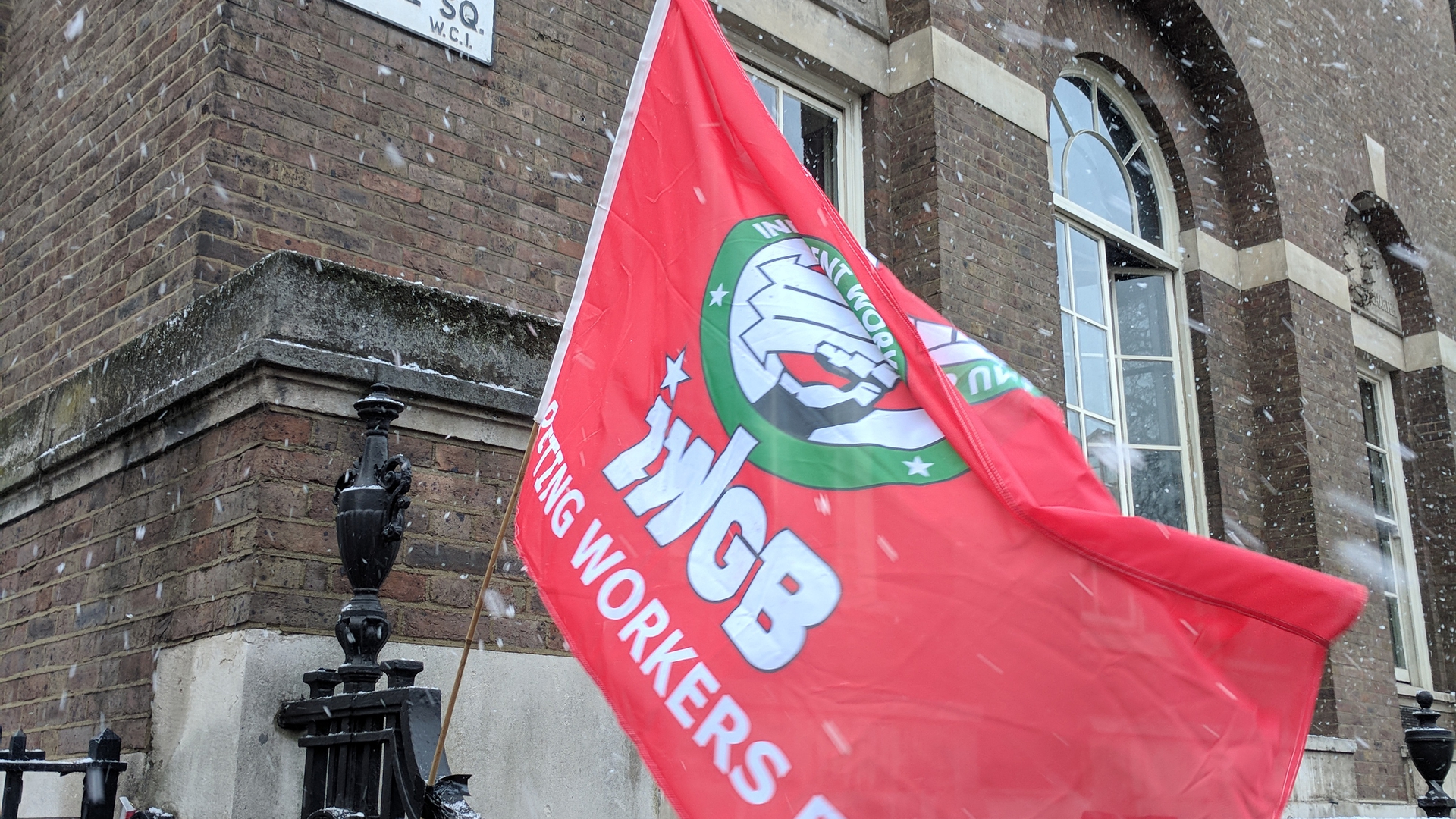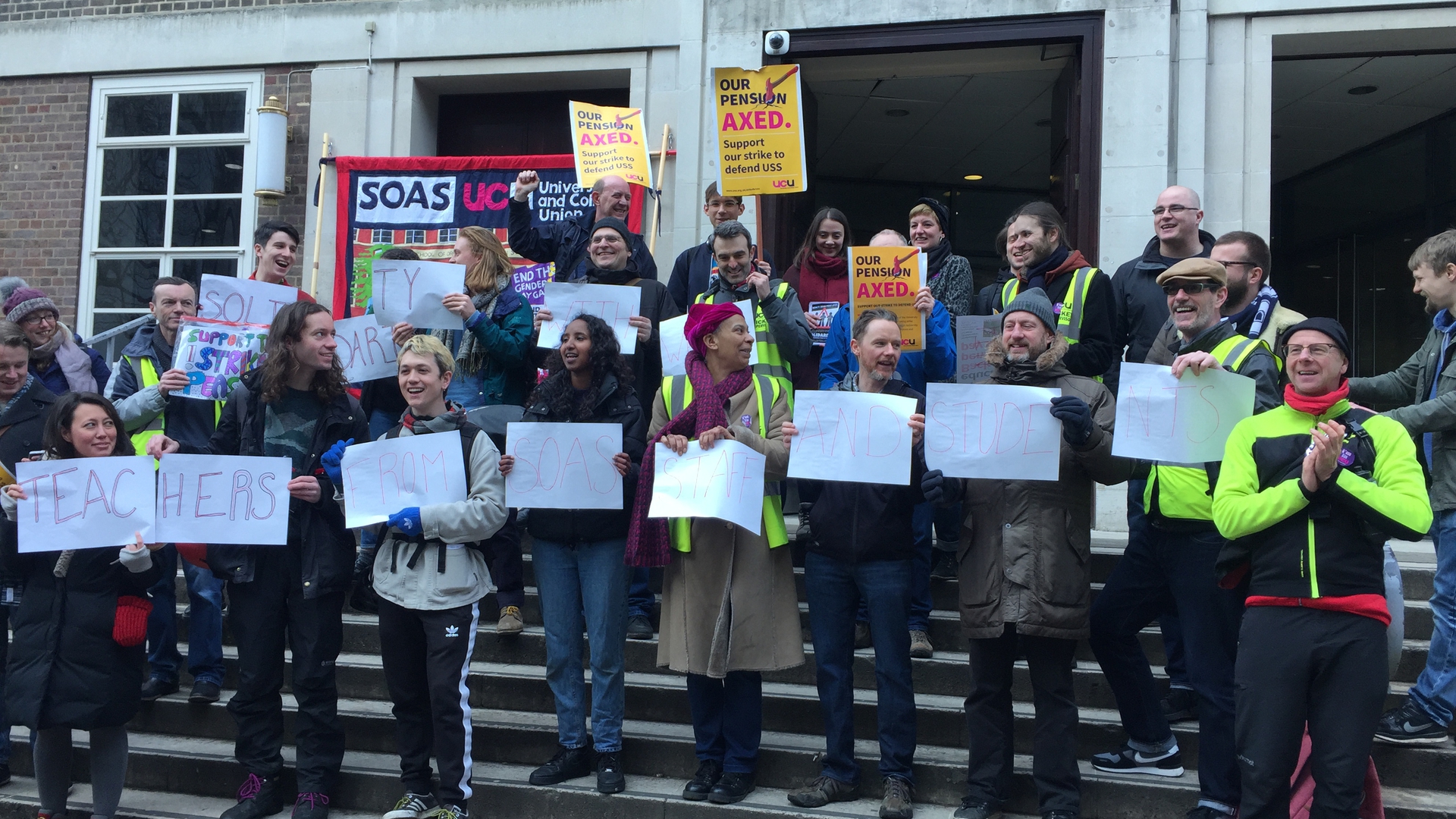A Post-Strike Proposal
by
Jamie Woodcock (@jamie_woodcock)
April 15, 2018
IWGB Strike on the 25th and 26th of April at Senate House

bulletins
A Post-Strike Proposal
by
Jamie Woodcock
/
April 15, 2018
IWGB Strike on the 25th and 26th of April at Senate House
This dispute was technically about the USS pension scheme, but for the rank and file who led the strike it was about so much more. We were told to wait until the pension fight. This means the strike has been a test of the UCU. Now that the deal is in, and the ballot is over, this strike has ended in a defeat.
We have collectively lost fourteen days of pay, investing our organising energies and creativity into the picket lines. Without this newfound rank and file power, we never would have got this far. But we could have got so much more.
Many of us who took action are a long way from our pensions. The strikes relied upon the activity of union members in precarious posts - some of whom cannot even afford to pay into the USS pension scheme. What have we won from this round of action? A temporary halt in whether we lose or keep a “comparable” pension scheme.
This defeat is not the end, but it does mean thinking and reflecting on what has happened so far. There were still 12,230 members (36%) who voted to reject the offer. This is an impressive number of people. The “No” vote happened despite the UCU leadership’s attempts to scare members into voting “Yes.” Before even voting, members had to read a statement from Sally Hunt. The online process – carried out by UCU officials in the head office – also had problems with lost ballots, coming at a time when most workers are away from campuses.
The result of the “Yes” vote is a Joint Expert Panel, which does not guarantee of a good outcome. By its very nature (as Sally Hunt points out) the outcome cannot be predicted. We are now being made to trust a small group of experts with our future in retirement.
This deferral to experts has been a problem throughout the dispute. It lets a small number (of unfortunately vocal people on social media) make claims about what is - or is not - possible in our dispute. There has been a tendency to try and make “reasonable” arguments to resolve the dispute.
The so-called pensions or industrial relations “experts” does not match the new kind of expertise has emerged on the picket lines. We know that our strikes can be disruptive. Not just disruptive to our workplaces, but also the status quo. Through strike action we can collectively demand things that are not “possible” or “reasonable.” Following the “expert” advice has led us into this defeat.
UCU members have met and formed networks across the country, putting forward a new vision of the union. To achieve this Sally Hunt and any official who acted against the rank and file must go. The ACAS deal needs to be answered for. This means calling for more branch meetings, motions, and a special sector conference, taking the spirit of the picket lines into the union. During this fight to democratise the UCU, we need to be careful the rank and file does not get co-opted by the bureaucracy or other groups like UCU left.
We need to keep organising. This ballot has been an attempt to demobilise the rank and file. There are two key things we can organise around for now. The first is the IWGB strike at Senate House - a strike that would have happened alongside our next UCU strikes.
Outsourced workers at the University of London are striking for equality as they protest outside Senate House. Over 100 cleaners, porters, security officers, receptionists, gardeners, post room staff and audiovisual staff will walk out on 25th and 26th of April after a near unanimous vote in favour of industrial action.
End outsourcing at UoL - Strike solidarity protest
The second is organising with other workers on our campuses. Rank and file activists can play an important role in supporting and learning from the emerging outsourcing campaigns on campuses. One way to do this is to dual-card with the IWGB, which some of us already do. This does not mean leaving UCU, but continuing the fight both inside and outside of the union. There are five reasons to do this:
-
The IWGB is a worker-led union. This means workers themselves decide the direction of campaigns.
-
The IWGB organises across the university, which can include everyone employed (whether outsourced or not). This means when we strike we can shut down the whole university.
-
The IWGB has active campaigns that you can get involved in. Not only campaigns with outsourced workers, but also organising with Uber and Deliveroo workers too.
-
The IWGB has won campaigns. Not tried to defend conditions and settled, but won.
-
Subs are just £8 a month.
Dual carding with the IWGB will not solve our problems. To do that we need to start with the workplace. This means finding our collective power: organising across the university with tactics and strategies that can win. At the LSE and King’s, it makes more sense to dual card with the UVW, coordinating with existing campaigns there. We should continue the fight to democratise the UCU, while organising on our campuses – there is room enough for both!
We also propose attending the UCU Rank and File network first meeting. This is the most promising initiative to come out of the dispute. There are important questions about how we can organise democratically inside UCU, and this meeting could be the start of that.
UCU Rank & File Revolt First Meeting
29 April at 13:00–16:00
City, University of London
Northampton Square, EC1V 0 London, United Kingdom
We may have lost this battle, but the fight for higher education is far from lost. If you want to get involved, then leave your contact details on the link below to find out about joining the IWGB:
author
Jamie Woodcock (@jamie_woodcock)
Subscribe to Notes from Below
Subscribe now to Notes from Below, and get our print issues sent to your front door three times a year. For every subscriber, we’re also able to print a load of free copies to hand out in workplaces, neighbourhoods, prisons and picket lines. Can you subscribe now and support us in spreading Marxist ideas in the workplace?
Read next

Victory is in sight, but no deal yet!
by
Notes from Below
/
March 24, 2018

